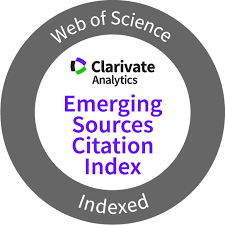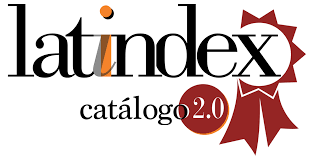Desinformación en salud y su impacto en el desarrollo sostenible (Scopus 2017-2023)
DOI:
https://doi.org/10.5783/revrrpp.v14i27.861Palabras clave:
desinformación, infodemia, ODS, Públicos, Investigación, SaludResumen
La creación y difusión de desinformación en salud, intencionada o no, es un problema social. La investigación, comprometida con la ciudadanía para el desarrollo de sociedades sostenibles, puede diagnosticar aquellos contenidos que generen un problema social para contribuir a su solución.
Este estudio analiza la desinformación en salud y su contribución al desarrollo sostenible, así como los grupos de interés en la literatura científica. Para ello, se realizó una revisión bibliográfica desde 2017 a 2023 en la base de datos Scopus. Se analizaron, adaptando la metodología de análisis del desempeño de Patra et al. (2023), un total de 81 artículos del área de las ciencias sociales.
Los resultados describen una producción científica, mayoritariamente europea, donde prescriptores formales, agencias de verificación y alfabetización mediática son los recursos más comunes para combatir la desinformación y mantener la credibilidad y confianza en las fuentes con autoridad. La actividad científica debería incluir, como objeto de estudio, el impacto de la desinformación en la salud de los públicos para contribuir a solucionar problemas sociales como metas de los Objetivos de Desarrollo Sostenible.
Descargas
Citas
Ahmad, A.R., Murad, H.R. (2020). The impact of social media on panic during the COVID-19 pandemic in iraqi kurdistan: Online questionnaire study (2020) Journal of Medical Internet Research, 22(5). https://doi.org/10.2196/19556
Ahmed, W., Vidal-Alaball, J., Downing, J., Seguí, F.L. (2020). COVID-19 and the 5G conspiracy theory: Social network analysis of twitter data. Journal of Medical Internet Research, 22(5). https://doi.org/10.2196/19458
Alba-Hidalgo, D.; Benayas-del-Álamo, J.; Blanco-Portela, N. (2020). Cómo evaluar los ODS en las universidades (2020). Red Española para el Desarrollo Sostenible (REDS). https://tinyurl.com/yz7spsn8
Almansa-Martínez, A., Fernández-Torres, M.J., Rodríguez-Fernández, L. (2022). Disinformation in Spain one year after COVID-19. Analysis of the Newtral and Maldita verifications. Revista Latina de Comunicación Social, 80, 183-200. https://doi.org/10.4185/RLCS-2022-1538
Al-Zaman, M.S., Sultana, M., Ahona, K.T.S., Sife, S.A., Akbar, M., Sarkar, N. (2020). Social Media Rumors in Bangladesh. Journal of Information Science Theory and Practice, 8(3), 77-90. https://doi.org/10.1633/JISTaP.2020.8.3.6
Al-Zaman, M.S. (2021). Social media fake news in India. Asian Journal for Public Opinion Research, 9(1), 25-47. https://doi.org/10.15206/ajpor.2021.9.1.25
Badell-Grau, R.A., Cuff, J.P., Kelly, B.P., Waller-Evans, H., Lloyd-Evans, E. (2020). Investigating the Prevalence of Reactive Online Searching in the COVID-19 Pandemic: Infoveillance Study. Journal of Medical Internet Research, 22(10). https://doi.org/10.2196/19791
Bangalee, A., Bangalee, V. (2021). Fake news and fallacies: Exploring vaccine hesitancy in South Africa. South African Family Practice, 63(1). https://doi.org/10.4102/SAFP.V63I1.5345
Becker, D.A. (2021). Using Mobile Apps to Combat Fake News. Journal of Electronic Resources in Medical Libraries, 18(1), 55-60. https://www.scopus.com/inward/record.uri
Bernal-Triviño, A. (2020). Habits and feelings regarding COVID-19 news coverage during lockdown in Spain. Tripodos, 49, 169-183. https://doi.org/10.51698/tripodos.2020.49p169-183
Brainard, J., Hunter, P.R., Hall, I.R. (2020). An agent-based model about the effects of fake news on a norovirus outbreak. Revue d'Epidemiologie et de Sante Publique, 68(2), 99-107. https://doi.org/10.1016/j.respe.2019.12.001
Calvo, D., Cano-Orón, L., Llorca-Abad, G. (2022). COVID-19 vaccine disinformation on YouTube: analysis of a viewing network. Communication and Society, 35(2), 223-238. https://doi.org/10.15581/003.35.2.223-238
Cárcamo-Ulloa, L., Cárdenas-Neira, C., Scheihing-García, E., Sáez-Trumper, D., Vernier, M., Blaña-Romero, C. (2023). On Politics and Pandemic: How Do Chilean Media Talk about Disinformation and Fake News in Their Social Networks? Societies, 13(2). https://doi.org/10.3390/soc13020025
Cardoso, A.J.C., da Silva, G.A. (2022). Fears, desires and concerns surrounding the Covid-19 syndemic and psychic suffering: university outreach experiences in the south of Bahia, Brazil. Interface: Communication, Health, Education, 26. https://doi.org/10.1590/INTERFACE.210675
Carrieri, V., Madio, L., Principe, F. (2019). Vaccine hesitancy and (fake) news: Quasi-experimental evidence from Italy. Health Economics (United Kingdom), 28(11), 1377-1382. https://doi.org/10.1002/hec.3937
Carson, A., Wright, S. (2022). Fake news and democracy: definitions, impact and response, Australian Journal of Political Science, 57(3), 221-230. https://doi.org/10.1080/10361146.2022.2122778
Casad, B. J., Garasky C. E., Jancetic, T.R., Brown A. K., Franks J.E., Bach, C.R. (2022). U.S. Women faculty in the social sciences also face gender inequalities. Frontiers in Psychology, 13, https://doi.org/10.3389/fpsyg.2022.792756
Catalán-Matamoros, D., Prada, E., Langbecker, A. (2023). Fact or fiction: An experiment on how information sources and message framing influence vaccine risk perception, Profesional de la Información, 32(5). https://doi.org/10.3145/epi.2023.sep.10
Colmenero-Ruiz, M.-J., Paletta, F.-C., Gonzales-Aguilar, A. (2023). Interactive mapping of Covid-19 disinformation in Ibero-America. Profesional de la Información, 32(5). https://doi.org/10.3145/epi.2023.sep.13
Cushion, S., Morani, M., Kyriakidou, M., Soo, N. (2022). (Mis)understanding the Coronavirus and How it Was Handled in the UK: An Analysis of Public Knowledge and the Information Environment. Journalism Studies, 23(5-6), 703-721. https://doi.org/10.1080/1461670X.2021.1950564
De Medeiros, P.M., De Medeiros, P.M. (2022). Fake news mediates the relationship between sociopolitical factors and vaccination intent in Brazil. Health Promotion International, 37(6). https://doi.org/10.1093/heapro/daac110
Dafonte-Gómez, A., Míguez-González, M.-I., Martínez-Rolán, X. (2022). The Ibero-American fact-checkers facing the COVID-19. Analysis of activity on Facebook. Observatorio, 16(1), 160-182. https://doi.org/10.15847/obsOBS16120221823
Das, R., Ahmed, W. (2022). Rethinking Fake News: Disinformation and Ideology during the time of COVID-19 Global Pandemic. IIM Kozhikode Society and Management Review, 11(1), 146-159. https://doi.org/10.1177/22779752211027382
Domgaard, S., Park, M. (2021). Combating misinformation: The effects of infographics in verifying false vaccine news. Health Education Journal, 80(8), 974-986. https://doi.org/10.1177/00178969211038750
Ebel R., Kissmann, S. (2011). Desarrollo sostenible: la investigación en un contexto intercultural, Ra Ximhai: revista científica de sociedad, cultura y desarrollo sostenible, 7(1), 69-79. https://tinyurl.com/2kfwdzct
Egelhofer, J.L., Boyer, M., Lecheler, S., Aaldering, L. (2022). Populist attitudes and politicians' disinformation accusations: effects on perceptions of media and politicians. Journal of Communication, 72(6), 619-632. https://doi.org/10.1093/joc/jqac031
Ehrenfeld, D., Barton, M. (2019). Online Public Spheres in the Era of Fake News: Implications for the Composition Classroom. Computers and Composition, 54. https://doi.org/10.1016/j.compcom.2019.102525
Elsevier (2023). Elsevier 2023 Sustainable Development Goals (SDGs) Mapping. https://tinyurl.com/y2ppacap
Elsevier (2023). ¿Qué son los objetivos de Desarrollo Sostenible? https://tinyurl.com/vc3k7nra
Erokhina, Y. (2022). Stereotyping of the Russian Orthodox Church in Fake News in the Context of the COVID-19 Pandemic: Semiotic and Legal Analysis. International Journal for the Semiotics of Law, 35(3), 1187-1213. https://doi.org/10.1007/s11196-022-09888-4
França, F.P., de Araújo, D.O., da Silva, M.B. (2020). The digital initiative CONVIDE-i9 in the fight against COVID-19 infodemia: brief action points, AtoZ, 9(2), 248-252. https://doi.org/10.5380/atoz.v9i2.76472
Fraser, S., Moore, D., Waling, A., Farrugia, A. (2021). Making epistemic citizens: Young people and the search for reliable and credible sexual health information. Social Science and Medicine, 276. https://www.scopus.com/inward/record.uri
Fujita, D.M., Nali, L.H.D.S., Sartori, G.P., Galisteo, A.J., de Andrade, H.F., Jr., Luna, E.J.A. (2022). Fake news and covid-19: A concern due to the low vaccine coverage in Brazil. Saude e Sociedade, 31(1). https://doi.org/10.1590/S0104-12902022210298
Galvão, T., Noll, P.R.E.S., Silveira, E.A., Noll, M. (2023). Fake news and misinformation in Brazil: critical analyses regarding scientific information in pandemic times. Journal of Human Growth and Development, 33(3), 493-500. https://doi.org/10.36311/JHGD.V33.14938
Gamir-Ríos, J., Tarullo, R. (2022). Characteristics of misinformation in social networks. Comparative study of news denounced as hoaxes in Argentina and Spain during 2020. Contratexto, 37, 203-228. https://doi.org/0.26439/contratexto2022.n037.5343
García-Borrego, M., Casero-Ripollés, A. (2022). What makes us vulnerable to COVID-19 fake news? A critical review of the factors conditioning susceptibility to misinformation. Estudios Sobre el Mensaje Periodistico, 28(4), 789-801. https://doi.org/10.5209/esmp.82881
García-Marín, D. (2020). Global infodemic: Information disorders, false narratives, and fact checking during the covid-19 crisis. Profesional de la Información, 29(4), 1-20. https://doi.org/10.3145/epi.2020.jul.11
García-Marín, D., Merino-Ortego, M. (2022). Anti-science disinformation about COVID-19 spread on Twitter in Hispanic America. Cuadernos.info, 52, 24-46. https://doi.org/10.7764/cdi.52.42795
García-Marín, D. (2022). Viralizing the truth: Predictive factors of fact-checkers’ engagement on TikTok. Profesional de la Información, 31(2). https://doi.org/10.3145/epi.2022.mar.10
García-Marín, D. (2023). Banning fake news in health emergencies. Predictors of opinion on the control of information in Spain, Estudios Sobre el Mensaje Periodístico, 2(2), 287-300. https://doi.org/10.5209/esmp.85070
Gibbons, A., Carson, A. (2022). What is misinformation and disinformation? Understanding multi-stakeholders’ perspectives in the Asia Pacific. Australian Journal of Political Science, 57(3), 231-247. https://doi.org/10.1080/10361146.2022.2122776
González, R.F., Rodríguez-Estrada, A., Saldierna, A.R. (2022). Mediations in disinformation that intervenes the taking of preventive measures in the face of the covid-19 health crisis. Contratexto, 38, 259-287. https://doi.org/10.26439/contratexto2022.n038.5536
Gradoń, K.T., Hołyst, J.A., Moy, W.R., Sienkiewicz, J., Suchecki, K. (2021). Countering misinformation: A multidisciplinary approach. Big Data and Society, 8(1). https://doi.org/10.1177/20539517211013848
Herrero-Diz, P., López-Rufino, C. (2021). Libraries fight disinformation: An analysis of online practices to help users’ generations in spotting fake news. Societies, 11(4). https://doi.org/10.3390/soc11040133
Herrero-Diz, P., Pérez-Escolar, M. (2022). Analysis of Hoaxes about COVID-19 Debunked by Maldita and Colombiacheck: Effects of the Infodemic on the Behavior of Society. Palabra Clave, 25(1). https://doi.org/10.5294/pacla.2022.25.1.7
Johnston, N. (2023). The Impact and Management of Mis/Disinformation at University Libraries in Australia. Journal of the Australian Library and Information Association, 72(3), 251-269 https://doi.org/10.1080/24750158.2023.2235646
Kefalaki, M., Karanicolas, S. (2020). Communication’s Rough Navigations: ‘Fake’ news in a time of a global crisis (2020) Journal of Applied Learning and Teaching, 3(1), 29-41. https://doi.org/10.37074/jalt.2020.3.1.19
King, K. (2019). Education, digital literacy and democracy: the case of Britain’s proposed ‘exit’ from the European Union (Brexit). Asia Pacific Education Review, 20(2), 285-294. https://doi.org/10.1007/s12564-019-09594-0
Kolluri, N.L., Murthy, D. (2021). CoVerifi: A COVID-19 news verification system. Online Social Networks and Media, 22. https://doi.org/10.1016/j.osnem.2021.100123
Lara-Navarra, P., Falciani, H., Sánchez-Pérez, E.A., Ferrer-Sapena, A. (2020). Information management in healthcare and environment: Towards an automatic system for fake news detection. International Journal of Environmental Research and Public Health, 17(3). https://doi.org/10.3390/ijerph17031066
Leal David, H.M.S., Martínez-Riera, J.R. (2020). Fake news and small truths: A reflection on the political competence of nurses. Texto e Contexto Enfermagem, 29, 1-12. https://doi.org/10.1590/1980-265X-TCE-2019-0224
López-Borrull, A. (2022). COVID-19: 8 lessons from the First Global Infodemic that should be an opportunity for libraries. Boletim do Arquivo da Universidade de Coimbra, (Extra 1), 83-103. https://doi.org/10.14195/2182-7974_extra2022_1_4
Losada Díaz, J.C., Rodríguez Fernández, L., Paniagua Rojano, F.J. (2020). Governmental communication and emotions in the covid-19 crisis in Spain. Revista Latina de Comunicación Social, 78, 23-40. https://doi.org/10.4185/RLCS-2020-1467
Liu, P.L., Huang, L.V. (2020). Digital Disinformation about COVID-19 and the Third-Person Effect: Examining the Channel Differences and Negative Emotional Outcomes. Cyberpsychology, Behavior, and Social Networking, 23(11), 789-793. https://doi.org/10.1089/cyber.2020.0363
Macarrón Máñez, M.T., Moreno Cano, A., Díez, F. (2023). Impact of fake news on social networks during COVID-19 pandemic in Spain. Young Consumers. https://doi.org/10.1108/YC-04-2022-1514
Malik, A., Bashir, F., Mahmood, K. (2023). Antecedents and Consequences of Misinformation Sharing Behavior among Adults on Social Media during COVID-19. SAGE Open, 13(1). https://doi.org/10.1177/21582440221147022
Mamak, K. (2021). Do we need the criminalization of medical fake news? Medicine, Health Care and Philosophy, 24(2), 235-245. https://doi.org/10.1007/s11019-020-09996-7
Maradei, A., da Silva, E.F.P. (2021). Covid-19: Fact-checking to contain disinformation about chlorochine and hydroxychlorocchine. Estudos em Comunicacao, 32, 161-182. https://doi.org/10.25768/21.04.03.32.07
Martín-Neira, J.-I., Trillo-Domínguez, M., Olvera-Lobo, M.-D. (2023). Ibero-American journalism in the face of scientific disinformation: Fact-checkers’ initiatives on the social network Instagram. Profesional de la Información, 32(5). https://doi.org/10.3145/epi.2023.sep.03
Martínez-Costa, M.P., López-Pan, F., Buslón, N., Salaverría, R. (2023). Nobody-fools-me perception: Influence of Age and Education on Overconfidence About Spotting Disinformation (2023) Journalism Practice, 17(10), 2084-2102. https://doi.org/10.1080/17512786.2022.2135128
Massarani, L., Waltz, I., Leal, T., Modesto, M. (2021). Narratives about vaccination in the age of fake news: A content analysis on social networks. Saude e Sociedade, 30(2). https://doi.org/10.1590/S0104-12902021200317
Mayo-Cubero, M. (2020). News sections, journalists and information sources in the journalistic coverage of crises and emergencies in Spain. Profesional de la Información, 29(2). https://doi.org/10.3145/epi.2020.mar.11
McKee, M., Van Schalkwyk, M.C.I., Stuckler, D. (2019). The second information revolution: Digitalization brings opportunities and concerns for public health. European Journal of Public Health, 29, 3-6. https://doi.org/10.1093/eurpub/ckz160
Miskolci, R. (2023). Beyond science denialism: disinformation during the Covid-19 pandemic. Sociologias, 25. https://doi.org/10.1590/18070337-123090EN
Ovchinnikova, I.G., Ermakova, L.M., Nurbakova, D.M. (2021). Who needs the red pill: hydroxychloroquine wars on Twitter. Monitoring Obshchestvennogo Mneniya: Ekonomicheskie i Sotsial'nye Peremeny, 6, 566-583. https://doi.org/10.14515/MONITORING.2021.6.1981
Patra, R.K., Pandey, N., Sudarsan, D. (2023). Bibliometric analysis of fake news indexed in Web of Science and Scopus (2001-2020). Global Knowledge, Memory and Communication, 72(6-7), 628-647. https://doi.org/10.1108/GKMC-11-2021-0177
Paul, O., Yesmin, S. (2023). Rethinking the Misinformation with its Detrimental Impact on Lives: A Qualitative Approach. Science and Technology Libraries. 1-16. https://doi.org/10.1080/0194262X.2023.2242432
Pedrero-Esteban, L.-M., Pérez-Escoda, A., Establés, M.-J. (2021). Brexit’s impact on Spanish media discourse: news coverage and audience reaction on Twitter. Profesional de la Información, 30(6). https://doi.org/10.3145/epi.2021.nov.10
Pérez-Curiel, C., Molpeceres, A.M.V. (2020). Impact of political discourse on the dissemination of hoaxes about covid-19. Influence of misinformation in public and media. Revista Latina de Comunicación Social, 78, 65-97. https://doi.org/10.4185/RLCS-2020-1469
Pérez-Dasilva, J.-Á., Meso-Ayerdi, K., Mendiguren-Galdospín, T. (2020). Fake news and coronavirus: Detecting key players and trends through analysis of twitter conversations. Profesional de la Informacion, 29(3), 1-22. https://doi.org/10.3145/epi.2020.may.08
Pichihua Vegas, S.P. (2022). Typology of viral misinformation content during the first months of the COVID-19 health emergency in Peru. Revista de Comunicacion, 21(2), 197-223. https://doi.org/10.26441/RC21.2-2022-A10
Pointon, M., Walton, G., Turner, M., Lackenby, M., Barker, J., Wilkinson, A. (2022). Information discernment and online reading behaviour: an experiment. Online Information Review. https://doi.org/10.1108/OIR-02-2021-0101
Puig, B., Blanco-Anaya, P., Pérez-Maceira, J.J. (2021). Fake News” or Real Science? Critical Thinking to Assess Information on COVID-19 (2021) Frontiers in Education, 6. https://doi.org/10.3389/feduc.2021.646909
Pulido, C. M., Villarejo-Carballido, B., Redondo-Sama, G., & Gómez, A. (2020). COVID-19 infodemic: More retweets for science-based information on coronavirus than for false information. International Sociology, 35(4), 377-392. https://doi.org/10.1177/0268580920914755
Raquel, C.P., Ribeiro, K.G., Alencar, N.E.S., de Souza, D.F.O., Barreto, I.C.H.C., de Andrade, L.O.M. (2022). Scientific ways to confront covid-19 fake news. Saude e Sociedade, 31(4). https://doi.org/10.1590/S0104-12902022210601en
Robie, D. (2022). Journalism education ‘truth’ challenges An age of growing hate, intolerance and disinformation. Pacific Journalism Review, 28(1-2), 29-46. https://doi.org/10.24135/pjr.v28i1and2.1240
Robledo, I., Jankovic, J. (2017). Media hype: Patient and scientific perspectives on misleading medical news. Movement Disorders, 32(9), 1319-1323. https://doi.org/10.1002/mds.26993
Roger-Monzó, V., Moreno-Castro, C., Cabrera-García-Ochoa, Y. (2021). Restricted diets: analysis of the press discourse on nutrition in times of Covid-19. Profesional de la Información, 30(6). https://doi.org/10.3145/epi.2021.nov.18
Rosa, T., Delduque, M.C., Alves, S.M.C. (2023). The COVID-19 pandemic and the fake news: a literature review. Saude e Sociedade, 32. https://doi.org/10.1590/S0104-12902023220918en
Rosinska, K.A. (2021). Disinformation in Poland: Thematic classification based on content analysis of fake news from 2019. Cyberpsychology, 15(4). https://doi.org/10.5817/CP2021-4-5
Rowe, S.B., Alexander, N. (2017). On Post-Truth, Fake News, and Trust. Nutrition Today, 52(4), 179-182. https://doi.org/10.1097/NT.0000000000000224
Rúas Araújo, J., Rodríguez-Martelo, T., Fontenla-Pedreira, J. (2021). Memes distribution during COVID-19 third wave. Cultura, Lenguaje y Representacion, 26, 209-227. https://doi.org/10.6035/clr.5843
Salaverría, R., Buslón, N., López-Pan, F., León, B., López-Goñi, I., Erviti, M.C. (2020). Disinformation in times of pandemic: Typology of hoaxes on Covid-19, Profesional de la Información, 29(3), 1-15. https://doi.org/10.3145/epi.2020.may.15
SDSN (2020). Acelerando la educación para los ODS en las universidades. Una guía para universidades e instituciones de educación superior y terciaria. New York: Sustainable Development Solutions Network (SDSN). https://tinyurl.com/3rmd7d9u
Shobowale, O. (2021). A systematic review of the spread of information during pandemics: A case of the 2020 covid-19 virus. Journal of African Media Studies, 13(2), 221-234. https://doi.org/10.1386/jams_00045_1
Talabi, F.O., Ugbor, I.P., Talabi, M.J., Ugwuoke, J.C., Oloyede, D., Aiyesimoju, A.B., Ikechukwu-Ilomuanya, A.B. (2022). Effect of a social media-based counselling intervention in countering fake news on COVID-19 vaccine in Nigeria. Health Promotion International, 37(2). https://doi.org/10.1093/heapro/daab140
Tan, C. (2022). Regulating disinformation on Twitter and Facebook Griffith Law Review, 31(4), 513-536. https://doi.org/10.1080/10383441.2022.2138140
Tan, C. (2022). The curious case of regulating false news on Google (2022) Computer Law and Security Review, 46. https://doi.org/10.1016/j.clsr.2022.105738
Tarullo, R., Gamir-Ríos, J. (2022). Scare to destabilise: disinformation about COVID-19 in Argentina and Spain. Cuadernos.info, 52, 47-68. https://doi.org/10.7764/cdi.52.42915
Teixeira, J., Martins, A. (2022). Thematic Patterns of Disinformation about COVID-19: The Framing of Checks in the Fato ou Fake and Lupa Agencies. Journalism and Media, 3(1), 27-39. https://doi.org/10.3390/journalmedia3010003
Thelwall, M., Abdoli, M., Lebiedziewicz, A., Bailey, C. (2020). Gender disparities in uk re-search publishing: differences between fields, methods and topics. Profesional de la información, 29(4), https://doi.org/10.3145/epi.2020.jul.15
Valera-Ordaz, L., Doménech-Beltrán, J. (2020). Socio-demographic profile and political attitudes of groups for and against limiting the free circulation of information during the pandemic, Profesional de la Información, 29(6), 1-15. https://doi.org/10.3145/epi.2020.nov.16
Visconti, A. (2020). The ‘fake news’ phenomenon: some criminological and criminal policy considerations. JUS Rivista di Scienze Giuridiche, 1, 43-72. https://doi.org/10.26350/004084_000051
Vysakh, C., Babu, H.R. (2022). Misinfodemic and Cyberchondria Experiences among Indians During COVID-19 Pandemic. International Journal of Information Science and Management, 20(3), 257-276. https://tinyurl.com/28r8sjd2
Wong, C.M.L., Wu, Y. (2023). Limits to inoculating against the risk of fake news: a replication study in Singapore during COVID-19 (2023) Journal of Risk Research, 26(10), 1037-1052. https://doi.org/10.1080/13669877.2023.2249909
Descargas
Publicado
Cómo citar
Número
Sección
Licencia
Derechos de autor 2024 ANA IBÁÑEZ-HERNÁNDEZ, María Carmen Carreton-Ballester

Esta obra está bajo una licencia internacional Creative Commons Atribución-NoComercial-SinDerivadas 4.0.
Los autores que publican en esta revista están de acuerdo con los siguientes términos:- Los autores conservan los derechos de autor y garantizan a la revista el derecho de ser la primera publicación del trabajo al igual que licenciado bajo una Creative Commons Attribution License que permite a otros compartir el trabajo con un reconocimiento de la autoría del trabajo y la publicación inicial en esta revista.
- Los autores pueden establecer por separado acuerdos adicionales para la distribución no exclusiva de la versión de la obra publicada en la revista (por ejemplo, situarlo en un repositorio institucional o publicarlo en un libro), con un reconocimiento de su publicación inicial en esta revista.
- Se permite y se anima a los autores a difundir sus trabajos electrónicamente (por ejemplo, en repositorios institucionales o en su propio sitio web) antes y durante el proceso de envío, ya que puede dar lugar a intercambios productivos, así como a una citación más temprana y mayor de los trabajos publicados (Véase The Effect of Open Access) (en inglés).





